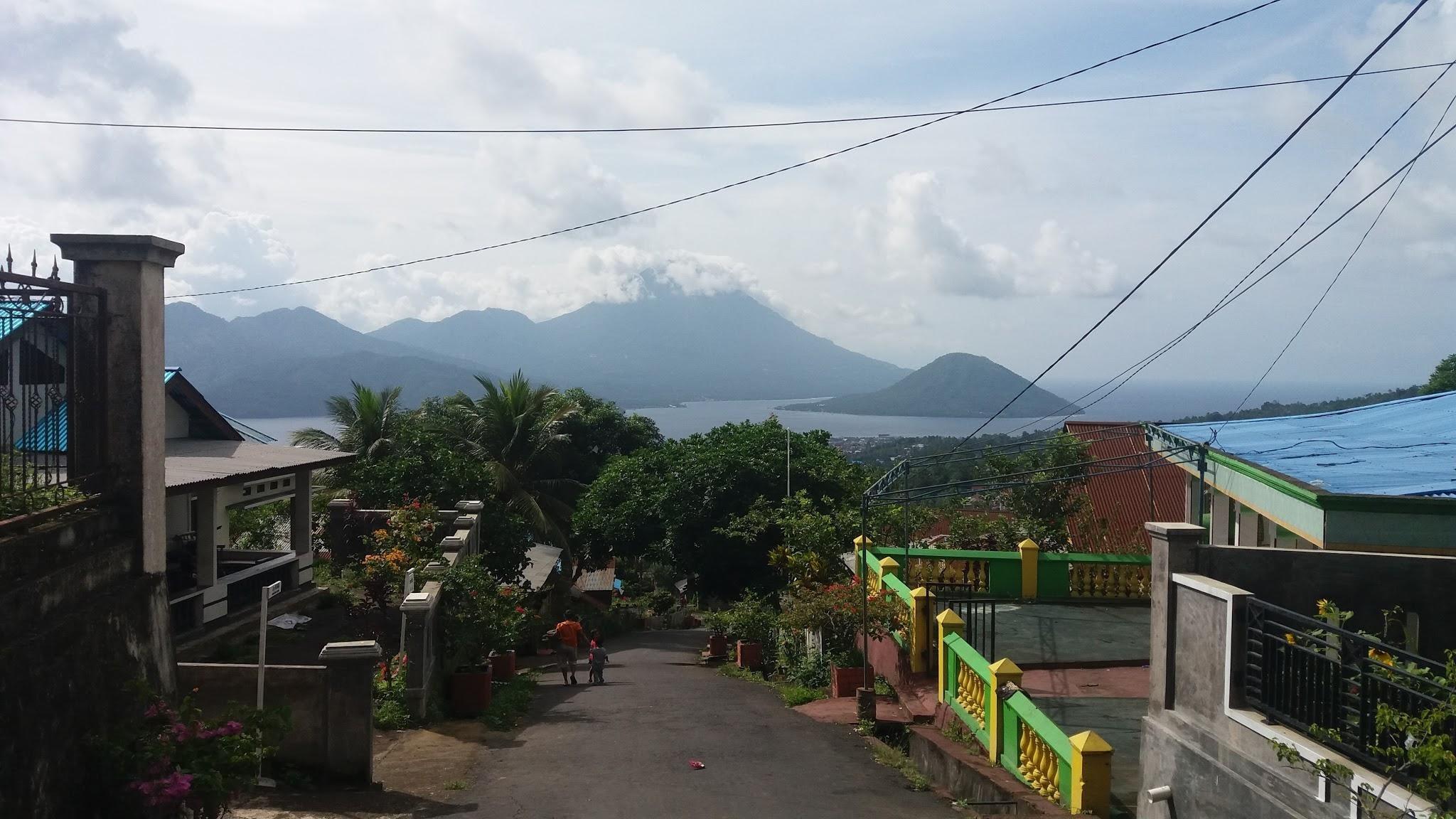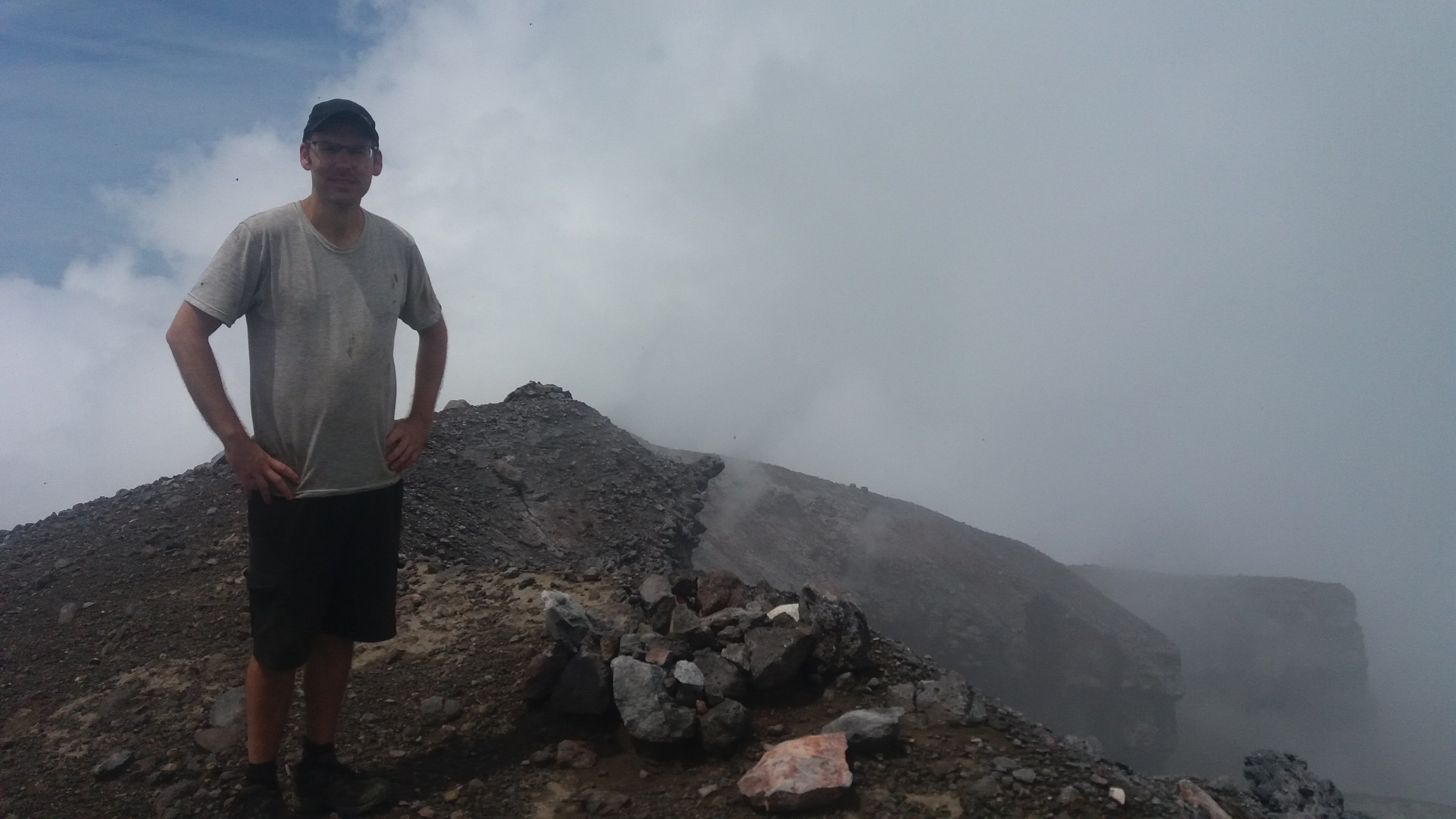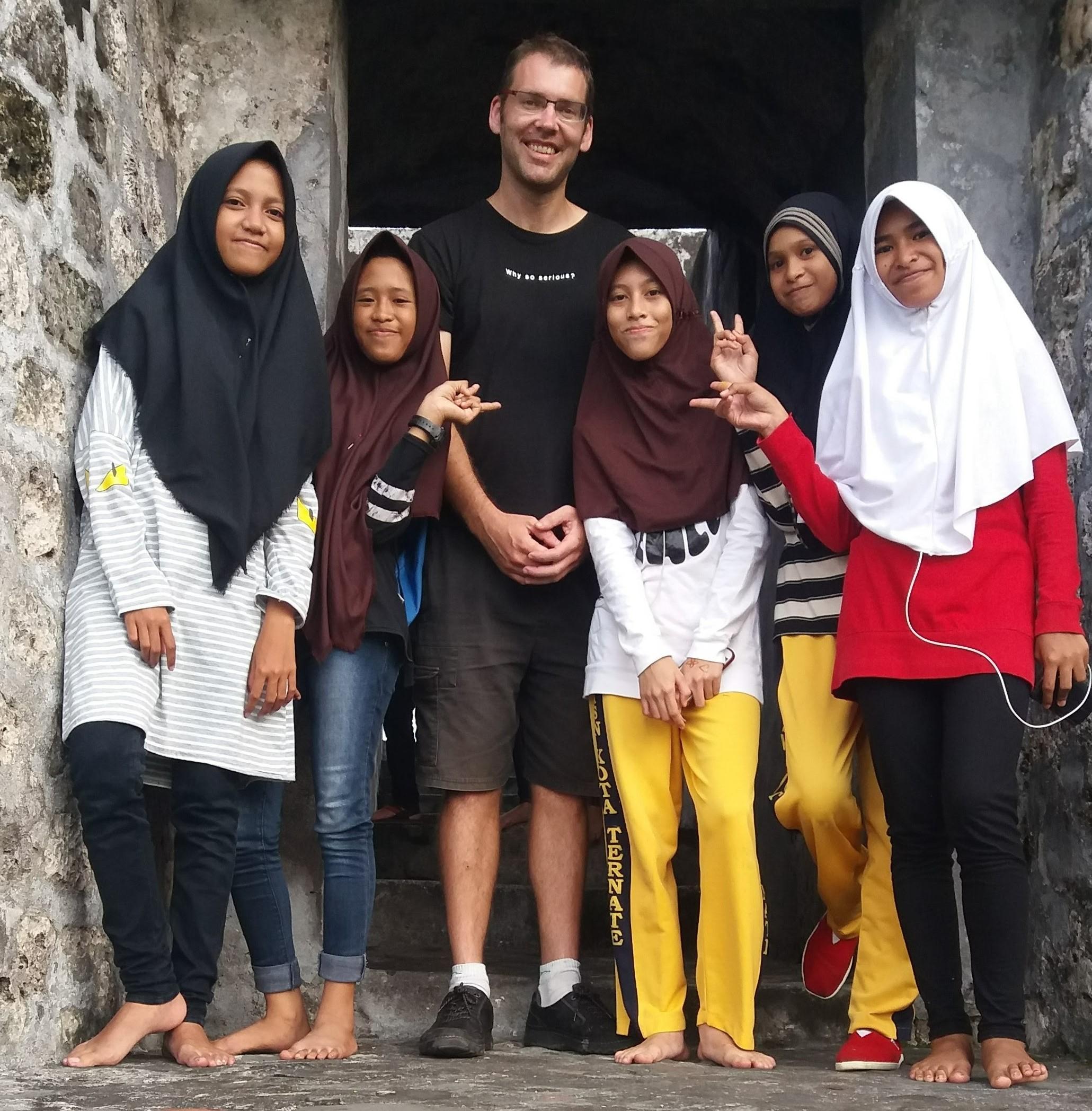
In Oct 2016 I travelled to North Maluku in Indonesia. Two islands there, Ternate and Tidore, are the most fascinating places I’ve been to in Indonesia. Not exactly tourist hubs, I had some trouble getting around with my basic Indonesian. The main aim was to climb the summits of these two volcanic islands. I managed one but not the other. Out of the material I gathered on the trip and subsequent reading, I wrote and sold a travel article, and published a short story. There is no direct link to the online short story, so I have polished it, renamed it, added some photos and posted it here.

Ternate is one of a string of volcanic islands just north of the equator in the Indonesian province of Maluku Utara. Before the Portuguese reached them in the early sixteenth century, Europeans had been searching for these islands for centuries because they were the source of the then precious spice: cloves.
The Sultan of Ternate allowed the newly arrived Portuguese to build a fort on his island. He was ever in need of allies as Tidore, home of a rival sultanate, was a short boat ride away. The two islands had been enemies since time immemorial, locked in a battle of mimetic rivalry: vying for the riches of the spice trade and land for growing food on the large island of Halmahera. Further afield they sought tribute from Sulawesi and Papua. Malukans believed maintaining the balance between the two islands was important to keep their world healthy. Ternate was always slightly ahead in the game, a stronger older brother, but Tidore, the cunning younger brother, had its moments.
Tidore featured a nearly perfect cone named Kiematabu while Ternate’s Gamalama peak was asymmetrical but no less beautiful. From time to time a Portuguese climbed Gamalama to scout for incoming ships. At the summit, there was a two-hundred-metre high hill of scoria rock containing a deep, sulphur belching, crater. From the crater’s edge, early morning before the clouds rolled in, the view of the other volcanic spice islands and Halmahera to the east was almost worth the arduous journey from Lisbon. The rocky hill was surrounded by a plateau covered in long grass. And then, after descending steep slopes covered in spiky rattan choked jungle, you came to the clove tree plantations and finally mountain villages.
The Portuguese wanted the locals of Ternate to sell cloves exclusively to them. However, the Sultan’s acquiescence to this demand was only of a Machiavellian nature. Why would he stop trading with the Arabs, Javanese and Chinese Sanglays from the Philippines who had been coming to the island for so long?
By 1570 the Portuguese presence on Ternate was not only limited to soldiers of (mis)fortune – priests had set up shop too. The Jesuits urged the Portuguese Governor, Mesquita, to do something about Sultan Hairun selling cloves to Javanese traders. Hairun was breaking the agreed-upon monopoly. These priests hated the Sultan, as he backed Islamists who blocked their proselytizing efforts. At this stage, Islam had a weak grip on the common people of Maluku and the priests were hopeful of gaining many converts to Christianity.
Mezquita took action. He sent a force of twenty men to the far side of the island, where they burned Javanese trading ships. Some poorly armed Javanese tried to stop the Portuguese and were made mincemeat. To escape responsibility for violence we say it’s enough never to be the first to do violence. No one ever sees themselves as casting the first stone. Hairun had thrown the first rock as far as the Portuguese were concerned.
Sultan Hairun was furious. After several scuffles between the two sides, Mezquita invited the Sultan to the fort for reconciliation. Hairun was no newbie to political intrigue having been held prisoner in the fort at various times. He’d visited the Portuguese Governor-General in Goa, usually wore Portuguese clothes and spoke the language – none of these things had saved him. Mezquita managed to separate the sovereign from his bodyguard and, in an act of bad political manoeuvring, stabbed Hairun to death. The Sultan had two servants beside him. An old man, holding an umbrella for the Sultan, tried to defend his lord and got stabbed himself. The other was a hunchback girl carrying the Sultan’s betel nut – she got away unharmed.
Hairun’s bodyguard broke out of the fort and spread the news. Chaos ensued around the island. Mourners went contrary: they paddled their kora-kora with the stern facing backwards, wore headdresses around their necks and played the flutes with their noses. The Sultan’s soldiers laid siege to the fort, yelling for Mezquita to be turned over to them.
Inside the fort there was rebellion, Mezquita was stripped of his title and sneaked outside at night. He was sent back to Malacca on a supply ship that’d been waiting offshore. When the locals learnt that Mesquita was gone they lifted the siege. Instead, they focused on guarding the two sailing ships at anchor nearby, so there was no escape for the Portuguese.
The new Sultan, Babullah, was a stronger, more ruthless character than his father and the people loved him for it. What a mistake to murder the old man, who at least had been somewhat malleable. Babullah traded for muskets, gunpowder and coats of mail. The crimson and purple Indian cloth his father had loved could wait. Crimson had reminded the old man of fresh mace – the covering from nutmeg seeds. In the name of Islam, Babullah was going to reestablish local dominance over the spice trade by driving the Portuguese out. The Sultan made sure the rice paddies around the fortress became a muddy wasteland and supplies were cut off – the battle of Ternate had begun.
Vitor Paulo Rocha became the new Portuguese governor. A man of some ability, it was a shame he became a leader in such a dire situation. A better choice than Mesquita, nevertheless he had a shadowy past. He’d been accused of corruption back in Portugal but was granted a pardon on the condition that he joined an expedition to the Indies. They said men who went to Goa were fortune seekers and those in Malacca adventurers. To end up in Ternate, that furthest Portuguese outpost, you had to have done something criminal.
A few months after the assassination, food became a problem for the Portuguese. In the fort, there were a lot of cloves and other spices, but very little else. The men subsisted on sago bread so hard it needed to be dipped in water. The days of trading with village women for jackfruit and bananas were over. Going out to collect water was a daily trial. At first, the locals just took potshots. But then one day, the Sultan’s soldiers attacked a party getting water from a brackish stream. One man received a deep sword cut to the leg – the blade was poisoned and he died in agony. Rocha then ordered that every time they left the fort the men must wear helmets, breastplates and quilted leggings. This command was unpopular as that gear was almost unbearable to wear in the tropical heat. The next supply ship from Malacca did not appear when due. Rocha knew there could be many reasons for this.
Every evening Rocha did his rounds – checking the guards upon the turrets were in place. The other men went to sleep early inside the stone barracks, Morpheus was their only comforter. They were out of liquor and the men had never taken to chewing betel nut. Sometimes Rocha came across Padre Goncalves pacing about inside the defensive walls. The priest genuflected incessantly as he walked. Rocha knew he didn’t do this from religious fervour. The truth was the priest’s mind had gone from being holed up in the fort too long. Goncalves had been a restless man, roaming the world, and of late the island, incessantly looking for converts. Now he was just another grey beard longing for Europe.
Rocha had seen something similar to Goncalves’ compulsive genuflecting with an Indian Tiger in Goa. The beast was kept in a large cage and would pace back and forth within, using exactly the same swing of the head on every turn. The owner of the tiger eventually couldn’t bear the dead-eyed pacing and had it made into a rug. Rocha had given up confessing some time ago. Confessing to Goncalves was like throwing your sins into the abyss to multiply. The other Jesuits in the fort weren’t much saner, men who had wanted to escape life by taking priestly vows – instead they had been plunged right into the middle of things and suffered accordingly.
Rocha thought about their chances of making it off Ternate. Even if they defeated the men guarding their ships, they would need time for repairs to make the vessels seaworthy. This would allow the Sultan a chance to regroup. What awaited them in Malacca anyway? Chains for some disobedience he was not yet aware of? Would they get shipwrecked on an island with no water? Or have the bad luck to land in Mindanao and become prisoners of the Castilians? There were thousands of possibilities. In theory, they were the glory of Portugal, conquering faraway lands, spreading the faith and making the king rich through opening new trade routes. In reality, Islamic traders had arrived first and embedded themselves, and the majority of Christian adventurers who set out for the Indies came to a bad end.
The people of Ternate kept up the pressure until the Portuguese garrison was reduced to a state beyond miserable. Eventually, the Sultan offered boats so that they could leave and Rocha accepted. The locals then occupied the fort themselves, Rocha knew that wouldn’t last for long, because the island was cursed with wealth. If not the Portuguese, some other group would arrive to make trouble. The Portuguese managed to creep back into the region and have a presence over the water in Tidore but they never returned to Ternate.
Against the odds, in 1577 Rocha made it back to Portugal. He became a fisherman, one of the better results out of any of the Portuguese adventurers from that age of exploration. When out fishing, Rocha had the habit of looking back at the skyline of Lisbon. He knew the beautiful palaces and churches he saw had been made a reality by distinct garrisons of criminals in miserable forts, trading for the spices that Europe was crazy about. Not only did cloves do simple things like preserve meat and sweeten the breath, but they also performed miracles – for instance, if mixed with oil, they could warn off the plague.
As a fisherman, Rocha’s days were of hard labour casting and pulling nets. A stark contrast to those idle tropical days, when his men did not care about life or death and slept as much as they could. In 1577 Rocha was not yet old, he got married a year after his return. Given his new way of making a living, he became a pescatarian, but his wife occasionally liked to cook meat. That was fine, but he begged her never to use cloves as a flavouring. The slightest whiff of that substance reminded him of the fort…the sweet fragrance of cloves contaminated by gunpowder and sweat.


